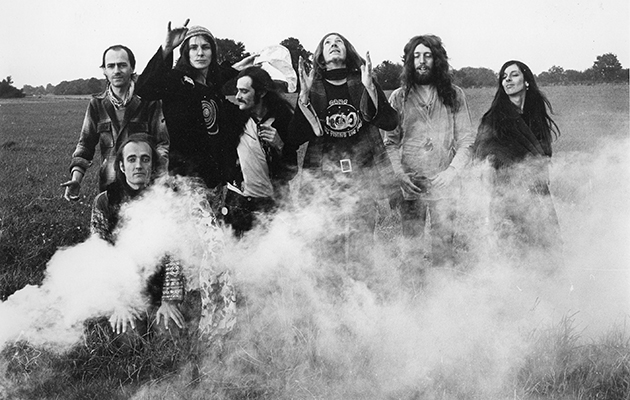This 19th-century hunting lodge – in a village 130km from Paris called Senf – was where Gong began in earnest, with a constantly mutating cast of percussionists, keyboard players and bassists. For the next three years the house became a commune, and the band was run as a co-operative. “There were around 15 people in the house – the band, the road crew and assorted girlfriends,” says Smyth. “We had a series of sound engineers, who we called the Switch Doctors. Every centime that we earned from gigs or royalties would go into a pot. If you wanted anything – writing paper, cheese, whatever – you’d put it on a list and we’d do a big shop every week.”
“The great thing about working in France at the time was that France was wonderfully free of the rules of rock’n’roll,” says Allen. “They had their ‘variété musique’ and all that horrible, cheesy pop that Eddie Barclay’s label released in the early ’60s, but otherwise it was a blank canvas. You could do anything. And psychedelia was a very handy cloak for encompassing my diverse interests. It would allow you to throw in elements of jazz, rock, Indian music, Chinese music, Balinese music, tape loops and whatnot and say, ‘Wow man, it’s really psychedelic!’ That appealed to me, because I was never remotely interested in rock’n’roll. I was a jazzer, a beatnik. Gong allowed me to channel the innovations of Ornette Coleman and Charles Mingus through the filter of psychedelia.”
Allen also cites the late 19th-century French absurdist Alfred Jarry as a key influence, along with some of the more anarchic elements of French political philosophy, like situationism. “By 1968 I had abandoned communism and embraced anarchism. I also liked to use absurdism as a weapon, to puncture the pompous and powerful. In May ’68 I remember confronting some armed paratroopers on the barricades with a teddy bear. That annoyed the humourless left-wing students almost as much as it annoyed the paratroopers!”
Malherbe shared Allen’s sense of theatrical absurdism. He would boil kettles on stage and insert a flute into the spout: when the kettle boiled he would improvise along with the boiling flute. He would dangle out a sock on the end of a fishing line while soloing, reeling in the audience.
Their debut album Magick Brother, recorded in October 1969 and released the next year, served as a compelling calling card for their live show. With few established gig venues in France, Gong set up their own circuit. Says Allen: “Together with [French prog-rockers] Magma, we contacted students at universities around France and set up a touring circuit. The students would promote the gigs, and they’d have incredible, radical ideas. We’d end up playing in these wonderful 17th-century theatres, the one night that Marcel Marceau wouldn’t be playing, for instance, or playing outdoors. It grew like a forest fire and within a few years it was enormous.”
These early live shows were frequently assisted by LSD. “We’d drop a tab every full moon, before a gig,” says Allen. “And we’d make sure that there was no curfew, because we’d end up playing until two, three in the morning. Acid became a kind of shamanic quest for us. If you take it carefully, it can take you into other dimensions, and the music will follow you. Once I was playing on stage in Tunisia: I knew I was on stage, but it felt like I was in a bedroom, with two round windows in front of me. I looked out of one of them and saw eyelashes and a balcony which looked like an eyelid. Then I looked further downwards and saw this hand playing the guitar. And slowly – because this was all happening in slow motion to me – I looked out and realised that what I thought were the lights of a thousand buildings were actually the audience watching me!”
Gong started to make a decent living in France. They appeared on French TV, wrote advertising jingles and even penned the theme music for the news on ORTF [the state-owned French TV station]. They also worked on several film soundtracks, including Jérôme Laperrousaz’s motorbike film, Continental Circus, Peter Foldes’ Je, Tu, Elles… and Martial Raysse’s incomprehensible arthouse movie, Le Grand Départ. Still, they were itching to return to England. In June 1971, around the time of the release of second LP, Camembert Electrique, Gong played their first UK gig, at a then-unknown festival in Glastonbury.
“I remember taking lots of ginseng,” says Allen, “and getting into the whole spiritual significance of the event. When we took to the stage, at sunset, hardly anyone was watching us. The moment we began, these people started winding down from the Tor, dancing, like an ancient, medieval scene. That’s when Gong was born in England.”


